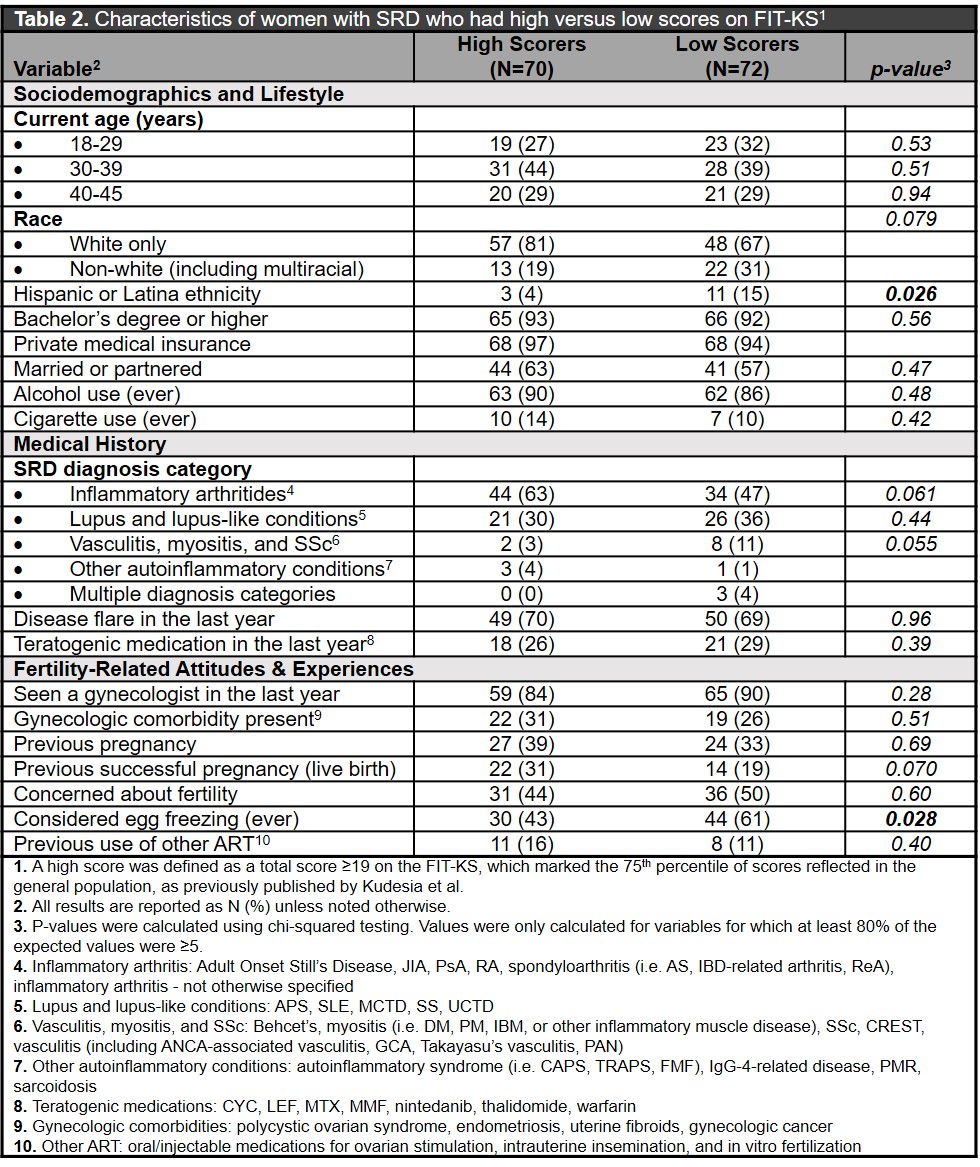Session Information
Date: Sunday, November 12, 2023
Title: (0460–0479) Reproductive Issues in Rheumatic Disorders Poster I
Session Type: Poster Session A
Session Time: 9:00AM-11:00AM
Background/Purpose: Fertility awareness is low in the population and is influenced by disparities in race, ethnicity, and socioeconomic status. Because systemic rheumatic disease (SRD) contributes to decreased fertility, identifying knowledge gaps and underlying factors among affected women is a key step towards improved counseling on fertility therapies. Here, we use a previously published instrument to determine whether fertility knowledge is affected by having an SRD or by other medical or sociodemographic factors.
Methods: We enrolled women ages 18-65 seen ≥2 times by a Hospital for Special Surgery rheumatologist from 2020-2022 in the Rheumatology Women’s Reproductive Health and Wellness Cohort; cohort enrollment is ongoing. This is an interim analysis that includes women aged 18-45 years with self-reported SRD, to whom we administered the Fertility & Infertility Treatment Knowledge Score (FIT-KS) (1). Using descriptive statistics, we compared FIT-KS scores in women with SRD to scores of reproductive-aged women in the general population, as previously published by Kudesia et al. Among women with SRD, we compared those with a total score ≥19 on the FIT-KS (“high scorers”) and those who scored < 19 (“low scorers”) in terms of sociodemographic, lifestyle, medical, and reproductive factors.
Results: In this interim analysis, 142 reproductive-aged women with SRD completed the FIT-KS, with a median total score of 18 (62% correct out of 29 questions) (Table 1). Compared to women in the general population, women with SRD were more frequently non-White (p=0.04) and Hispanic/Latina (p=0.02), more highly educated (p< 0.01), and less likely to have had successful pregnancies (p< 0.01). The SRD population was more aware of the risks of infertility due to smoking (p=0.03), sexually transmitted infections (p=0.01), and being underweight (p< 0.01). Women with SRD were more frequently correct about success rates for in vitro fertilization (IVF) for women older than 44 years (p=0.02) but less frequently correct about success rates per thawed egg after oocyte cryopreservation (OOC) (p< 0.01). Compared to high scorers on the FIT-KS, low scorers were more frequently Hispanic/Latina (p=0.03) and more likely to have considered OOC (p=0.03) (Table 2).
Conclusion: Compared to a previously reported sample of women in the general population, women with SRD performed qualitatively better on the FIT-KS, with greater knowledge of modifiable infertility risk factors and IVF, but less knowledge of OOC. Among women with SRD, those with decreased fertility awareness were more frequently Hispanic/Latina and more open to OOC. Future multivariate analysis is planned, but our results suggest a relationship between demographic characteristics and fertility awareness and highlight important knowledge gaps among women with SRD, particularly related to options for fertility preservation.
References:
1. Kudesia R, Chernyak E, McAvey B. Low fertility awareness in United States reproductive-aged women and medical trainees: creation and validation of the Fertility & Infertility Treatment Knowledge Score (FIT-KS). Fertil Steril. 2017 Oct;108(4):711-717.
To cite this abstract in AMA style:
Adurty S, Masto L, Smole A, Siegel C, Lieber S, Levine J, Stamm B, Mandl L, Lockshin M, Barbhaiya M, Sammaritano L. Knowledge Related to Fertility and Infertility Treatments Among Women with Systemic Rheumatic Disease [abstract]. Arthritis Rheumatol. 2023; 75 (suppl 9). https://acrabstracts.org/abstract/knowledge-related-to-fertility-and-infertility-treatments-among-women-with-systemic-rheumatic-disease/. Accessed .« Back to ACR Convergence 2023
ACR Meeting Abstracts - https://acrabstracts.org/abstract/knowledge-related-to-fertility-and-infertility-treatments-among-women-with-systemic-rheumatic-disease/


